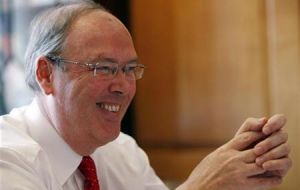MercoPress. South Atlantic News Agency
Bank of England remains divided 6 to 3 on interest rate hike
 Long-time hawk Andrew Sentance voted again for a half-point hike
Long-time hawk Andrew Sentance voted again for a half-point hike Six members of the Bank of England’s nine-strong Monetary Policy Committee, including Governor Mervyn King, continued to oppose the minority campaign for an immediate rise in benchmark UK interest rates at the MPC’s meeting two weeks ago, minutes revealed Wednesday.
The pound fell in the immediate wake of publication of minutes of the March 9 and 10 meeting, which dampened financial market expectations of a swift rise in base rates.
The minutes reveal the MPC is considering the recent surge in oil prices not only from the perspective of its upward impact on inflation but in terms of its potential dampening effect on demand and growth.
Long-time MPC hawk Andrew Sentance voted again for a half-point hike in UK base rates from their record low of 0.5%. Fellow external MPC member Martin Weale voted for a quarter-point increase in rates, as did Bank of England chief economist Spencer Dale.
In contrast, long-standing dove Adam Posen voted for an easing of monetary policy. He voted to hold base rates, and also to increase the scale of the Bank of England’s boost to UK money supply from £200 billion to £250bn to provide further stimulus to the economy.
The meeting took place before this week’s revelation that annual UK consumer prices index inflation surged from 4% in January to 4.4% in February on the back of surging household heating bills and clothing prices.
However, the minutes show the MPC acknowledged when it held base rates two weeks ago that “there was a significant risk that inflation would exceed 5% in the near term”.
The minutes also signal the MPC majority does not share Mr Sentance’s major concern that above-target inflation will fuel higher pay settlements.
Detailing the MPC’s discussion on this point the minutes state: “While there were some signs that private sector wage settlements had picked up at the beginning of the year, they provided only very tentative evidence of higher pay pressures”.
The minutes also highlight the MPC view that “indicators of consumer spending and sentiment had deteriorated sharply” and, setting out committee members’ thinking on this point, they add: “It was possible that they presaged a more sustained period of weak spending growth, perhaps as the impacts of the fiscal consolidation and near-term above-target inflation on household finances became more readily apparent.”
On the other hand, the minutes reveal MPC members noted signs in business surveys of recovery in the economy, after a quarter-on-quarter fall of 0.6% in UK GDP in the final three months of last year, and an improvement in the net trade position.




Top Comments
Disclaimer & comment rulesCommenting for this story is now closed.
If you have a Facebook account, become a fan and comment on our Facebook Page!